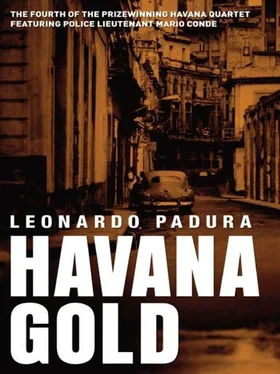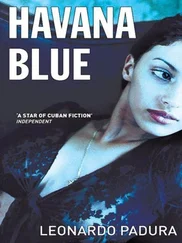Conde let her take a breath and was pleased he’d dispatched Manolo to talk to the forensic doctor. If the sergeant had been able to overcome his fear of dogs, he’d have launched a fresh attack right away. While he waited, Conde remembered again that it was Friday. Friday at last, he’d told himself when he opened his eyes that morning to discover miraculously that everything was in order and he didn’t have a headache. Only ideas.
The moment his flabby descent seemingly came to an end and his policeman buttocks anchored to a spring that had survived the weight of a thousand bums, the Count smiled. She followed suit, as if apologizing for her welcome speech, and when she did she almost looked beautiful. Dagmar was around thirty but retained the fragility of an adolescent who has yet to blossom: big mouth and teeth as if in a growth spurt, eyebrows spreading to the bridge of her nose and a degree of imbalance between legs and arms that were over-long for her skinny thorax and tiny breasts.
“What can you tell me about Lissette’s private life? Who did she use to go out with? Who was her current love?”
“You know, lieutenant, I don’t know very much about any of that. I’m married and have a child and as soon as classes finish I rush back home. But she was, as you say, a modern girl, and not one with commitments like me. I did meet one boyfriend she had, Pupy, but they fell out, although he still went after her and picked her up from Pre-Uni every so often. He’s a looker, for sure. I don’t know what else… Come to think of it, she never said much about that side of her life.”
“Had she been going out with a man who was in his forties?”
Dagmar’s smile faded. She stroked her forehead with her long fingers, as if trying to chase away sudden pain or squash an unexpected train of thought.
“Who told you that?”
“Caridad Delgado, Lissette’s mother. She mentioned him but didn’t know who he was.”
Dagmar smiled again and looked towards a distant corner of her house. In addition to physique which made Conde uncomfortable, the departmental head exuded an excessive sense of responsibility.
“No, lieutenant, I can tell you nothing about that man. She never mentioned him. I expect he was a flash in the pan.”
“Perhaps, Dagmar… They say she had very good relationships with her pupils.”
“That is certainly true,” the teacher answered straight away. She seemed pleased by the turn in the conversation. “She got on very well with them all and I think they were very fond of her. The fact is she was very young.”
“Did she ever tell you why she didn’t do her Social Service in the interior of the island?”
“No… Well, she did once say something about a stepfather, I don’t know if you are aware…”
“I imagined that must be it. When was the last time you saw Pupy around Pre-Uni?”
“On Monday. The day before…”
“Is there anything else you think it’s important I should know about Lissette?”
She smiled again and crossed her legs.
“I don’t know, just imagine… Lissette was like an earthquake; she turned everything upside down. She was always doing something, was always ready to have a go. And was ambitious: everyday she’d make it plain she could be much more than a mere chemistry teacher like me. But she wasn’t one to climb over everyone else. It was just she was so full of energy. I can’t imagine anyone wanting to do that to her. That was horrible, really barbaric.”
A madman, a psychopath who beats his victims, then rapes and strangles them. Could Skinny be right? Or would everything be much simpler if she were an opera singer?
“Dagmar, there’s something stands out in all this business and don’t be afraid to answer me sincerely. I’ll treat whatever you say confidentially… There was a party at Lissette’s the night she was killed. Music, rum, and people smoking dope,” the Count counted each element on his fingers and saw the surprise in the teacher’s eyes provoked by the last item of information. “Do you have any idea if Lissette smoked? Have you heard any talk about dope at Pre-Uni?”
“Lieutenant,” she said after pausing a long time to think. She passed her magician’s fingers back across her brow, never once smiling.
“No, it’s not very nice, I know,” concluded the Count, “this is what you call serious.”
“I can’t imagine Lissette doing anything of the sort. I refuse to believe that. People can say what they like. It’s not true people always speak well of the dead… And forget the idea about kids smoking dope in Pre-Uni. It’s quite ridiculous. Forgive my plain speaking.”
“You’re forgiven,” the Count conceded, struggling to lever his behind out of the quick sands of her sofa. When he’d recovered the two-leggedness that meant so much in man’s evolution, he had to re-position his pistol that threatened to slip out of his waistband. He then thought perhaps Manolo should have been there, and in his honour, declared with suitable acerbity, “I’d had great expectations of this conversation. I still think you could have been more helpful. Remember someone is dead, a friend of yours, and any scrap of information is useful right now. Forgive my saying this, but I have a job to do: I don’t really know why, but I think you’re holding something back. Look, these are my contact numbers. If anything else comes to mind, ring me, Dagmar. I’d be very grateful. And don’t be afraid.”
He had legs of stone. He’d sit on a stool in the entrance to the cockpit, and, holding the rooster in one hand, lean his legs of stone slightly backwards so the back of the stool rested against the doorpost made of caguairán , the hardest of Cuban woods. He then stroked the cock, fingered its neck and breast, combed its tail, cleaned the sawdust from its feet and blew on its beak, and injected his own breath. He was always poking a toothpick in his mouth and I was afraid he would swallow it one day. He had some small scissors in his shirt pocket and when he’d caressed and soothed his rooster he’d say “Come on, you beauty. Up you get, you fine fellow.” He’d take his scissors and start clipping its feathers, I don’t know how he did all that with his two hands, moving the bird as if it were a toy and the cock moving with him, as the scissors trimmed and the feathers fell on his legs of stone and the cock became even more handsome, a perfect beauty, red thighs and red comb and spurs as long as needles, no, spurs of a fighting cock. By that time of day the sun was filtering through the branches of the tamarind tree and in that light Granddad seemed speckled by the sun, himself a huge fighting bird. The rich smell from the neighbouring bakery wafted on the air in the cockpit entrance, mingled with the unmistakable odour of feathers, the vapour from the liniment for the birds’ muscles, the stench of fresh chicken shit and the aroma from the wood chips covering the floor of the enclosed arena. He will kill or be killed, he’d tell me, when he let the cock go to peck in the grass, sitting me on his legs, that felt as hard as stone. The fate of the cock was an everyday issue, and I wanted to tell him to give it to me as a present, that it was such a beautiful cock, that I wanted it for myself and didn’t want it to be killed, ever. “Look at it scratch; look at it strut. This is a blue-blooded bird, it’s got balls, can you see them?” and I thought a cock’s balls never hang down, they’re inside, and they drop them for just a second, when they mount the hen, but so quickly you never see them – until I discovered my Grandfather was a poet and that the cock’s balls business was a metaphor, or a chance, happy association, as Lorca would say – a man who knew nothing about fighting cocks, but all there was to know about bulls and bullfighters, but that’s another story: yes, you could see it had balls. I sometimes dream about Grandfather Rufino and his roosters and it’s a dream of death: all those perfect animals died in some contest, and my grandfather died from a dearth of fights and poetry, when cock-fighting was banned and when he became so old his legs of stone went soft and he could no longer go to clandestine pits and be sure to run faster than the police. Then he aged to his bones: “Never start a fight if you’re not intent on winning,” he always told me, and, when he knew all was lost, he didn’t fight any more. A poet of war. I don’t know why I’m thinking so much of you today. Or perhaps I do: seeing him, his legs of stone and the stool leaning against the caguairán doorpost, I learned, quite unawares, that he and I shared the fate of the fighting cock.
Читать дальше











